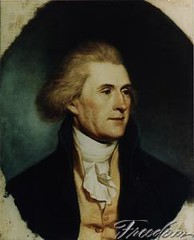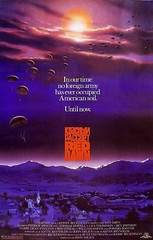
"God forbid we should ever be twenty years without such a rebellion....what country can preserve its liberties, if its rulers are not warned from time to time, that this people preserve the spirit of resistance? Let them take arms... The tree of liberty must be refreshed from time to time, with the blood of patriots and tyrants. It is its natural manure."
-- Thomas Jefferson, 1787

Last Thursday the United States Court of Appeals for the District of Columbia Circuit, the second most important court in the land with regard to federal Constitutional matters, delivered a major opinion regarding the provision of the Bill of Rights that is most difficult to reconcile with the prevailing sentiments of cosmopolitan Americans — the Second Amendment, which reads in full:
"A well regulated Militia, being necessary to the security of a free State, the right of the people to keep and bear Arms, shall not be infringed."

In essence, the court stepped in to the longstanding debate between those who interpret the Amendment as an *individual* liberty to own guns and those who see a *collective* right of states to maintain militias. The holding: that the Second Amendment confers upon each American the right to own, and maintain assembled in their homes, weapons of the sort that would commonly be used in military service. The reasoning: the first Congress wanted to ensure militia readiness without a large standing army by requiring citizen soldiers to show up with their own guns when called to serve, and also wanted to support the Jeffersonian maxim that the threat of armed revolution was an essential, if implicit, extra-Constitutional check on abuse of federal power.

Wow. Can I have my Uzi now? How about some grenades? Is this gonna be like Red Dawn? Wolverines!
Sure, the Israelis and the Swiss expect citizens to keep military weapons in their homes and be ready to serve to defend the homeland. That all seems very culturally appropriate and mostly non-threatening. But the idea of a 100 million or so Americans showing up with their assault rifles and SUVs to defeat the invading Venezuelan hordes seems, somehow, anachronistic. Isn't that what we pay Blackwater for?
Don't get me wrong. The result, and the reasoning, deeply appeal to my libertarian sensibilities. I'm all for the grey flannel and red tie crowd being afraid of angry mobs carrying military weapons, Alex Jones and his crew driving their Ford "best in Texas" pickups up the Capitol steps. But the whole thing just seems so...science fictional.

Remember. The Declaration of Independence is not a source of law. And despite the compelling scarlet tones of Jefferson's musings, there is no express Constitutional right to revolt. To the contrary, opposing the federal government with arms is the one federal crime that is punishable by death regardless of whether any violent acts are committed:
"whoever, owing allegiance to the United States, levies war against them or adheres to their enemies, giving them aid and comfort within the United States or elsewhere, is guilty of treason and shall suffer death, or shall be imprisoned not less than five years and fined under this title but not less than $10,000; and shall be incapable of holding any office under the United States." -- 18 U.S.C. § 2381

But somehow, a popular belief in the nullifying right of the People to take back the power entrusted to the government persists, even among the elite. A meme planted in most grade schools, rationalizing the original legitimacy of the American Revolution. (Not unlike the popular belief in jury nullification sustained by a thousand courtroom dramas — the power of the People, through the jury, to disregard the law where the interests of subjectively derived "Justice" compel.) The social contract, it appears, has some implicit conditions and carve-outs.
Can you imagine the radical change in conditions it would take to rouse fat and happy Americans from their couch potato slumber to violently oppose their government? They can't even be bothered to vote!
Perhaps it makes perfect sense that policy should be guided by a futurist manifesto of permanently imminent imaginary revolution, when the whole foundation of the system is an alt-history counterfactual. The political theory underlying the American Republic derives its genius from speculative imagineering into the past and future (albeit with implementation details like the core provisions of the Constitution informed by pragmatic experience).
Hobbes is the deep core, with his counter-extrapolation of the State of Nature: an imaginary pre-history worthy of Robert E. Howard, in which groups of barbaric humans compete violently for control of limited resources — a milieu in which life is "nasty, brutish, and short." From this evocative proto-cinematic construct, he conceives of the idea of the social contract, an implicit collective consent to the governance of a sovereign with plenary Droit in the interests of socio-economic order.

Locke, the lodestone for the American Founders, examines that base and notes that, if the contract is breached by the sovereign, a right to revolt naturally follows. Providing the pseudo-legal reasoning recited in the Declaration as the natural law support for the Revolution. Laying a thread that runs all the way to the D.C. Circuit's opinion:
"...the Second Amendment protects an individual right to keep and bear arms. That right existed prior to the formation of the new government under the Constitution and was premised on the private use of arms for activities such as hunting and self-defense, the latter being understood as resistance to either private lawlessness or *the depredations of a tyrannical government* (or a threat from abroad)."
All of this purporting to be, in essence, a codification of "natural rights" derived through the projection of intellect into the Platonic (or Divine) ether. In otherwords, an exercise of the human imagination.

Meanwhile, in sunny Guantanamo Bay, Khalid Shaikh Mohammed uses more or less the same "right to revolt" reasoning while pleading in his own defense at his enemy combatant hearing, as revealed in the hearing transcripts released Wednesday — contending his own actions at arms are the moral equivalent of George Washington's.**
"[W]e derive from religious [learning] that consider we and George Washington doing same thing. As consider George Washington a hero, Muslims many of them are considering Usama bin Laden...If now we were living in the Revolutionary War and George Washington he being arrested though Britain, for sure, they would consider him enemy combatant."

Nice try! If the jihadis were to ultimately prevail and co-opt Hollywood, one can imagine this scene playing right into the line of formulaic American mythos courtroom dramas, with Tim Robbins or Tom Hanks as the earnest white boy defense lawyer, lone paladin of Justice a la Sharia Americana — Atticus Finch of the jihad.
Surely they are all fooling themselves, though. Do not hold your breath waiting for a D.C. Circuit opinion finding an actual right of revolt protects someone from criminal prosecution. It may be a dream of the alienated, it may even be a legal "reality" in the constitutions of New Hampshire, Tennessee, North Carolina, Greece, and Germany (I think I know why), but don't count on any sovereign to ever apply the right in the real world. State power backed by force of arms trumps abstract rights every day of the week on this planet. The only way one will ever find revolutionary conduct exculpated based on the right of revolution is after the 'blood of tyrants" has been spilled and the revolutionaries have won. In the meantime, here in hyperreality, we occupy the dream world future imagined by the guys in the powdered wigs, where we know we can always pull our bazookas out of the closet if it gets too bad. What's on TV?
** See also KSM's morbidly entertaining laundry list of previously unknown AQ plots, including the assassination of Jimmy Carter.
For a link two browses off a Dungeons and Dragons site (albeit DM of the Rings), that is pretty darn insightful. "Dream future:" I like.
ReplyDeleteTranslated: I agree, but....
Have you considered the religious context? i.e. Anti-Catholicism in Hobbes and Locke; evangelical millenarianism in the American myths of future history?
Erik Lund-from-H-Net.
Erik -- Thanks! Of course, there's always a religious angle; when you are talking about early America it is inextricable from the political thought -- the pragmatism of the founders underpinned by the "City on a Hill" heaven on Earth utopianism of the Puritan settlers, which to me is the most potent and persistent thread of the American origin myth guiding people's thoughts about the role of the Republic.
ReplyDelete